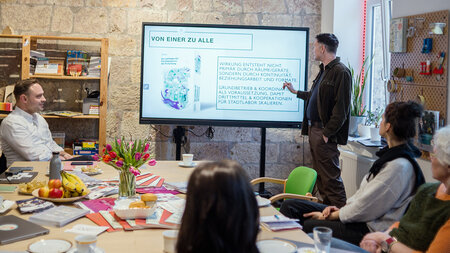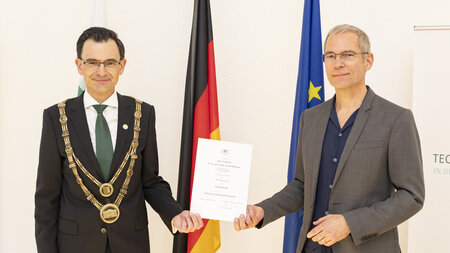Forschungskolloquium des Instituts für Psychologie
Ansprechpartner
In diesem Semester wird das Institutskolloquium in Präsenz und Online stattfinden. Sie finden bei den einzelnen Vorträgen Informationen dazu, ob der Vortrag im Institut für Psychologie oder digital stattfindet.
Die Seite wird laufend aktualisiert. Terminwünsche und Informationen bitte über Prof. Dr. Stefan Brandenburg kommunizieren.
Veranstaltungsdaten im Wintersemester 2025/2026
Vortragsraum (Online): https://webroom.hrz.tu-chemnitz.de/gl/ste-uhi-qkc-wy1
Vortragsraum (Präsenz): W.-Raabe-Str. 43, 09120 Chemnitz - Raum 102
Dienstag, 15:30 Uhr - 17:00 Uhr
| Termin | Referent:in und Thema |
| 21.10.2025 |
Termin verfügbar |
| 28.10.2025 |
Termin verfügbar |
| 11.11.2025 |
Dr. Jonathan Anomaly (Herasight). The science and ethics of embryo selection for psychological traits. (ONLINE) I will begin this talk with an overview of how accurate polygenic scores for cognitive ability are, and how parents using in vitro fertilization (IVF) can use these scores to help decide which embryo to implant. I will then address how much we should worry about problems like pleiotropy (or “off-target” effects) when parents choose an embryo with a high polygenic score for cognitive ability. I will end with ethical considerations, as well as a brief overview of what other psychological traits parents may wish to influence through decisions about embryos. |
| 18.11.2025 |
Christoph Abels (Universität Potsdam). Die Herausforderungen hyperindividualisierter generativer künstlicher Intelligenz (HYBRID) Generative künstliche Intelligenz (GenKI) verändert die Interaktion zwischen Mensch und Maschine und gestaltet das Informationsökosystem grundlegend neu. Ähnlich wie soziale Medien durch ihre Algorithmen Online-Erlebnisse personalisieren, können GenKI-Systeme Nutzerpräferenzen berücksichtigen und so den Zugang zu und die Verarbeitung von Informationen individuell anpassen. Durch Training, Feinabstimmung und gezieltes Prompting entsteht dabei jedoch eine noch tiefere Form der Personalisierung – Hyperindividualisierung. Indem GenKI ihre Antworten dynamisch an explizite und implizite Präferenzen der Nutzer anpasst, kann sie unbeabsichtigt Verzerrungen, Fehlüberzeugungen und Missverständnisse verstärken. Besonders problematisch ist dies im Bereich der gesundheitsbezogenen Informationssuche, wo sich die adaptiven Fähigkeiten von GenKI mit dem genKI-vermittelten Bestätigungsfehler der Nutzer überschneiden. In Anlehnung an bekannte Muster der Online-Informationssuche identifizieren wir drei zentrale „Druckpunkte“, an denen Verzerrungen besonders wahrscheinlich auftreten: (1) die Formulierung von Suchanfragen, (2) die Bevorzugung glaubenskonformer Inhalte und (3) die Abwehr glaubensinkonsistenter Informationen. Da technische Schutzmaßnahmen allein vermutlich nicht ausreichen, schlagen wir eine Reihe ergänzender Interventionen vor – darunter die Förderung digitaler Kompetenz, die Stärkung kritischer Auseinandersetzungsstrategien sowie eine verstärkte regulatorische Aufsicht. Zusammengenommen sollen diese Maßnahmen die sichere Integration von GenKI in den Alltag unterstützen, informierte Entscheidungsfindung fördern und die Integrität des öffentlichen Verständnisses im Gesundheitsbereich wahren. |
|
25.11.2025 |
Termin verfügbar |
| 02.12.2025 |
Prof. Bernd-Friedrich Voigt (Fachhochschule Südwestfalen). Vertrauen in der Mensch-KI Interaktion (MKII) – Erweiterung des Models von Kaplan et al. (2023) auf der Basis der Ergebnisse einer qualitativen Analyse zu MKII Vertrauenserwartungen von Top Führungskräften (ONLINE) Vertrauenswürdige Künstliche Intelligenz umfasst technische und nichttechnische Anforderungen, die ein KI-System erfüllen muss, damit es als vertrauenswürdig gelten kann und Menschen dem KI-System vertrauen können. Kaplan et al. (2023) haben dazu aufbauend auf meta-analytischen Befunden ein einschlägiges KI-Vertrauensmodell vorgestellt, dass jedoch aufgrund seiner hohen Abstraktion nur bedingt auf spezifische (insbesondere außergewöhnliche) Anwendungskontexte übertragbar ist. Wir fokussieren einen solchen außergewöhnlichen MKII Anwendungskontext mit hoher individueller und gesellschaftlicher Relevanz. Konkret untersuchen wir die Bedingungen des Vertrauens, unter denen Spitzen-Führungskräfte sich vorstellen können, KI-basierte Agenten als individuelle Partner für die Karriereentwicklung zu akzeptieren, um das Risiko von Führungsversagen (Management Derailment) zu mindern. Auf der Grundlage von acht problemzentrierten, semi-strukturierten Interviews mit C-Level-Führungskräften in Deutschland identifizieren wir multidimensionale Vertrauensanforderungen, die für erfolgreiches MKII in diesem besonderen Anwendungskontext essenziell sein könnten. Unsere Ergebnisse tragen zur Theoriebildung über Vertrauen in MKII bei, indem sie das Meta-Modell der Mensch-KI-Interaktion nach Kaplan et al. (2023) kontextualisiert validieren und rekonfigurieren. Darüber hinaus schlagen wir einen ersten Satz vorläufiger Gestaltungsprinzipien für vertrauenswürdige KI-Agenten in Kontexten der Führungskräfteentwicklung (Executive Development) vor. |
| 16.12.2025 |
Nina Butterer (HdM Stuttgart) Vertrauen durch Design: Wahrnehmung von virtuellen Assistenten im ERP-Kontext (HYBRID) Virtuelle Assistenten gewinnen im ERP-Kontext zunehmend an Bedeutung und werden als fester Bestandteil digitaler Arbeitsprozesse betrachtet. Der Vortrag untersucht die Wirkung unterschiedlicher Avatarformen, insbesondere den Vergleich zwischen abstrakten und menschenähnlichen Avataren. Auf Basis einer Befragung (N = 31) mit einem Avatar-Prototypen aus einem ERP-System wurde analysiert, wie der Grad der Menschlichkeit die Wahrnehmung von Kompetenz, Sympathie und Vertrauen beeinflusst. Die Ergebnisse dienen zugleich als Grundlage für Empfehlungen zur Weiterentwicklung des virtuellen Assistenten im Einklang mit zentralen Markeneigenschaften des Unternehmens. |
| 06.01.2026 |
Termin verfügbar |
| 20.01.2026 |
Termin verfügbar |
| 27.01.2026 | Termin verfügbar |
| 03.02.2026 |
Termin verfügbar |
| 06.02.2026 |
Achtung: Der Termin ist ein Freitag und die Zeit und der Onlineraum sind ebenfalls abweichend zu den üblichen Terminen. Cleotilde Gonzalez Carnegie (Mellon University): Designing Complementary Intelligence: Cognitive Foundations for Human–AI Teaming (ONLINE) The next frontier in AI is not about building more powerful models, it is about creating complementary intelligence between humans and machines. This talk explores how insights from cognitive science can guide the design of AI systems that enhance rather than replace human decision-making. I will introduce the concept of Cognitive AI, which models core human cognitive processes such as learning and decision making, and contrast it with the large-scaleoptimization focus of Machine AI. I will describe how these paradigms can be integrated to support effective human–AI teaming. Through mechanisms of shared representations, bidirectional goal translation, human-guided training, and coevolution, we can build AI that aligns with human preferences, supports human judgment under uncertainty, and enables adaptive collaboration in dynamic environments. I will provide an overview of a few examples of Cognitive AI systems that illustrate the interaction between Cognitive and Machine AI. |






